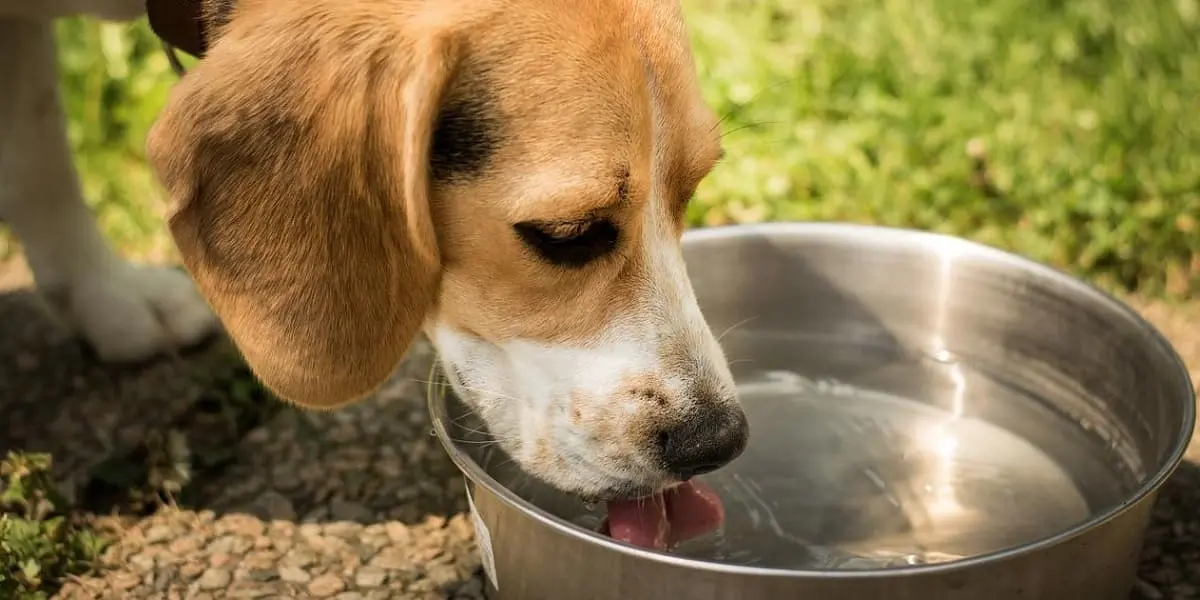Contents
Does your dog drink a lot and more regularly? During the summer season, this behavior is not abnormal as the animal seeks to regulate its body temperature. However, if you notice a sudden change with excessive thirst outside of this period, it may be a sign of an underlying disease of varying severity. So what are the possible causes? What diseases cause overconsumption of water? What treatment should be considered? And in which cases is a veterinary examination necessary?
My dog drinks a lot: what is the cause?
On a daily basis, dogs naturally regulate their body temperature by moisturizing themselves. This is especially true in the summer when he will tend to sweat more than usual. That’s why it’s a season when the dog drinks a lot and regularly during the day. Generally speaking, specialists agree that water intake varies between 30 and 40 ml per kilo per day. For example, for a dog weighing 20 kg, it will be necessary to count 3/4 of a liter of water per day. In high season, a higher water consumption is not abnormal.
On the other hand, if a dog starts to drink a lot of water outside the summer season or beyond the indicated amount, you must react quickly. This may be a sign of an illness that needs to be diagnosed as soon as possible for better management. Among the possible causes, the animal can suffer from renal or hepatic insufficiency, diabetes or other diseases such as Cushing’s disease (hypercorticism).
Which disease for a dog that drinks a lot?
If you notice that your dog is drinking too much water, it may be a deeper problem that needs to be identified as soon as possible by your veterinarian. In fact, certain illnesses of varying degrees of severity or behavioral problems can trigger excessive thirst in your dog.
Polydipsia and polyuria in dogs
If your dog is drinking heavily (polydipsia) and urinating heavily (polyuria), don’t hesitate to consult your veterinarian to better understand the cause. Some of the most common causes of these two conditions are kidney failure, diabetes or hypercorticism (abnormally excessive secretion of cortisol).
Kidney disorders in dogs
Kidney problems in dogs lead to excessive thirst. In the case of kidney failure, the dog will try to compensate for the lack of hydration by drinking more. In some cases, the dog may also have kidney disease or renal glycosuria, which causes repeated urination. In rarer diseases, there is also nephrogenic diabetes insipidus which blocks water reabsorption, causing the dog to drink more.
Hypocalcemia, hypokalemia and generalized cancer in dogs
For the most serious diseases, a dog that drinks a lot can have cancer. This is why it is essential to consult your veterinarian as soon as possible in case of abnormal behavior. For more benign causes, the animal can also suffer from hyperparathyroidism, which causes an abnormally high production of parathyroid hormone (PTH) with abundant thirst. In these cases, it is possible to opt for an adapted treatment aimed at limiting hypercalcemia (increase in the level of calcium in the plasma) or hypokalemia (low concentration of potassium in the blood). Again, you should consult your veterinarian in order to choose a treatment specifically adapted to your dog.
What other possible causes for a dog that drinks too much?
Other possible causes of a heavy drinking dog include a uterine infection that can cause uncontrollable thirst in the bitch. Certain behavioral problems can lead to psychogenic polydipsia, which manifests as excessive thirst and a sudden desire for water. In addition to a visit to the veterinarian, a visit to an animal behaviorist can help you better understand the problem.
My dog drinks a lot: what treatment exists?
In case of abnormal behavior, whether it is excessive thirst or abundant urination, it is essential to turn to a veterinarian as soon as possible to have your dog’s health checked. Depending on the diagnosis, the veterinarian may suggest additional tests such as a urine analysis, an abdominal ultrasound or a blood test to better determine the causes of this sudden change and propose an appropriate treatment.
- Discover also
- What is a dog’s temperature?
